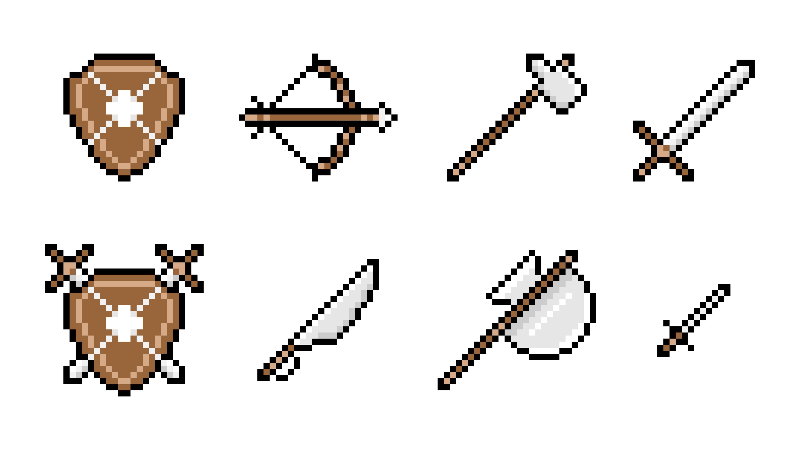F2P & Members-Only OSRS Skill Guide
By Kyle Meagher | January 28th, 2018 | Categories: RuneScape
With 23 total skills to choose from in Old School RuneScape (OSRS), it’s entirely possible to play the game for years before you find yourself wondering: “What does the herblore skill even do?” Luckily, PlayerAuctions is here with our brand new OSRS Skill Guide to give you a brief rundown of every skill in the game. Let’s get started!
Table of Contents
Free-to-Play Skills
Attack
For new players, the relationship between the three melee combat skills (attack, strength, and defense) can be a bit confusing, but we’re here to clear it up for you. The attack skill determines a players accuracy in combat when using a melee weapon. Accuracy influences whether or not you will “hitsplat” an opponent and damage them. The attack skill also dictates the type of weapons you can equip, which indirectly increases your damage, but it plays no direct role in influencing the amount of damage you can strike.
Strength
Strength is all about doing more damage to your opponents in combat. Certain items, such as granite armor, mauls, and halberds also require a minimum skill level to use, but free-to-play characters are most familiar with it because of its influence on the damage a character does. Your maximum hit value will be increased by your strength faster than your attack weapons can keep up, so, for this reason, many melee users will train strength about 1.3 times higher than their attack level.
Defence
The defence stat is widely misunderstood to have a benefit on the amount of damage that an opponent hits on your character. It has no effect on the amount of damage received, but the defence does decrease the chance that an opponent’s attack will hit you. It is partially responsible for your Magic resistance, together with the player’s magic level. It also allows you to wear higher-level armors.
Ranged
Ranged is a unique combat skill because the player’s Ranged Accuracy, Ranged Strength, and Ranged Defence are all increased by that player’s Ranged Level. For this reason, it is widely trained by even melee users, as it provides a wide range of benefits for the relative increase in combat level. Members have access to a lot of interesting ranged weapons, such as knives and chinchompas.
Magic
Magic, like ranged, is a widely trained skill regardless of combat preference for the range of benefits it provides. You’ll find many spells with non-combat related benefits, such as High-Level Alchemy, teleportation spells, and enchantments. However, Magic is also a very combat friendly skill line. According to the Combat Triangle, magic fighters are weak against ranged users and strong against melee fighters, but even so mages often best ranged opponents. Regardless of your preferences, magic is a valuable skill even just for its teleportation benefits and should not be neglected.
Hitpoints
Perhaps the most straightforward skill, you gain hitpoints experience when you do damage to an opponent or take damage yourself. This skill is often forgotten about as it levels without additional effort while training, but Pure or PVP users sometimes wish to keep this level low to avoid gaining unnecessary combat levels.
Prayer
Prayer is undoubtedly the hardest combat skill to train for any player. It requires a lot of time, money, and tedious effort of burying bones or offering them at the chaos alter. However, the high-level prayer bonuses are invaluable for serious combat, and even at low levels, players gain decent resistance and attack bonuses. If you’re just starting off, pick up and bury bones for any opponents you kill and you’ll have gained some significant prayer experience before you know it.
Crafting
Crafting is a free-to-play skill, but due to its time-consuming training process and relatively little benefit without members-only items, it is not very often trained by non-members. It allows the player to create items like pots and cooking wares, as well as armors and jewelry. The most popular items gained from this are the d’hide line of armors, which are members-only crafting items. Battlestaffs are another popular product of this skill, though they don’t return as much profit for the user due to the high-volume of them in the game already.
Runecrafting
Like crafting, this skill is available to non-members but most benefits will be seen for members who achieve high levels. To begin training this skill, the Rune Mysteries quest must be completed, and thereafter it is extremely slow-going. However, if you are a magic user who can use the runes and you don’t mind the effort, high-level runecrafting is extremely profitable and can be a lot of fun.
Mining
Mining is one of the most popular and profitable skills in OSRS and requires very little prerequisite for the player – only a pickaxe. Though members will have a much easier time finding places to mine in peace and avoid bots, free-to-play mining can be equally profitable and is not much more difficult to train. Runite ore, the most profitable in the game, is a free-to-play item.
Smithing
With the ores gained from mining, smithing can be used to create all of the classic weapons and armor you see players wearing. Additionally, gold bars and silver bars can be made for the crafting skills from gold and silver ores. Smithing is trained both when smelting ore into bars and when using those bars to make items at an anvil.
Woodcutting
Woodcutting is the classic money-making method for most new players. Everyone who has played OSRS has spent some amount of time woodcutting, it’s even the very first task you are assigned at Tutorial island. Like mining, all that’s needed is your tool which in this case is an ax. Walk in any direction and you are bound to find a tree. There are both non-members and members-only trees throughout the world, but members-only trees are most commonly found in members-only areas.
Firemaking
The firemaking skill allows a player to, uh, light fires. There’s not a lot to it, just a tinderbox and some logs you have the level to burn. Often low-level players will find it useful for cooking the food they pick up while training, but as levels increase its relative benefit plummets. However, there is always the pyromancer outfit to shoot for, and the skill cape looks sweet!
Fishing
Fishing is the non-members best method for acquiring large amounts of raw food. Nets and fishing poles are used at lower levels, but as the levels increase harpoons and lobster traps also become available for catching better and more valuable fish. Sharks, one of the most popular food items in the game, are acquired this way.
Cooking
Your cooking level increases your chance of successfully cooking food without burning it as well as allowing you to cook more complex recipes. These recipes can heal your hitpoints, but some food and drink have additional skill benefits. There are a variety of different food types available, as well as methods. You can cook fish over fires, bake cakes and pizzas, and even brew ale or cider.
Members-Only Skills
Agility
The agility skill allows you to use the shortcuts (green arrows facing the right on your minimap) to access different areas. It also influences the rate at which your energy replenishes, potentially allowing your character to travel on foot much more quickly. Some areas of the game may only be accessed if a player has a high enough agility level, and many require a minimum strength as well.
Herblore
Herblore is not the most obvious-sounding name for the skill which allows you to make potions. Like runecrafting, a quest must be completed to begin training this skill – in this case, it’s the Druidic Ritual quest. Experience is gained when you clean herbs, add herbs to a vial of water and finish a potion with a second ingredient. This skill can be extremely profitable if you achieve higher levels, as herbs sell relatively cheaply on the Grand Exchange compared to the profit from a finished potion.
Thieving
Another highly-profitable skill, thieving determines the likelihood you will be caught stealing or pickpocketing. You’ll also be able to pick locked doors and disarm traps which appear in many mini-games, so many players train thieving to at least a comfortable minimum level to make general gameplay easier. Thieving, specifically the method called blackjacking, can provide massive GP per hour, as well as rare items like seeds and uncut gems.
Fletching
The art of making bows and arrows: Fletching arrows requires a knife, wood, and arrowheads, while fletching bows require a knife, wood, and the proper bowstring. While high level ranged items are not particularly sought after for use by other players, they are popular items for High-Alchemy and thus this skill can be extremely profitable if combined with high woodcutting and magic levels.
Slayer
Slayer is maybe the biggest draw for non-members to become a member. It provides a very fun and very profitable way to train your combat skills. To begin this skill line, you must speak with a Slayer master, usually Turael in Burthorpe or Krystilla in Edgeville. Though it requires a lot of effort and knowledge, Slayer provides some of the best entertainment in OSRS and incorporates a lot of the best aspects of OSRS.
Farming
Farming allows a player to plant seeds in a farming patch and harvest the plants which grow from it. Plants take varying amounts of time to grow, and a player must use a variety of tools (such as spades, seed dibbers, gardening trowels, baskets, and sacks) to plant and harvest them.
Construction
Construction is the sole skill related to building your house and all the décor and furniture you will put inside of it. Though it is sometimes referred to as a “vanity skill,” houses can be used for storage and supply a host of skill related items. Often players take this up as a way of showcasing and displaying their accolades and achievements in the game.
Hunter
The Hunter skill is used to trap or capture wild animals. While it is not particularly useful at low levels nor a reliable way of making money, some very rare items can be acquired through the hunter skill including chinchompas and dragon impling jars.














